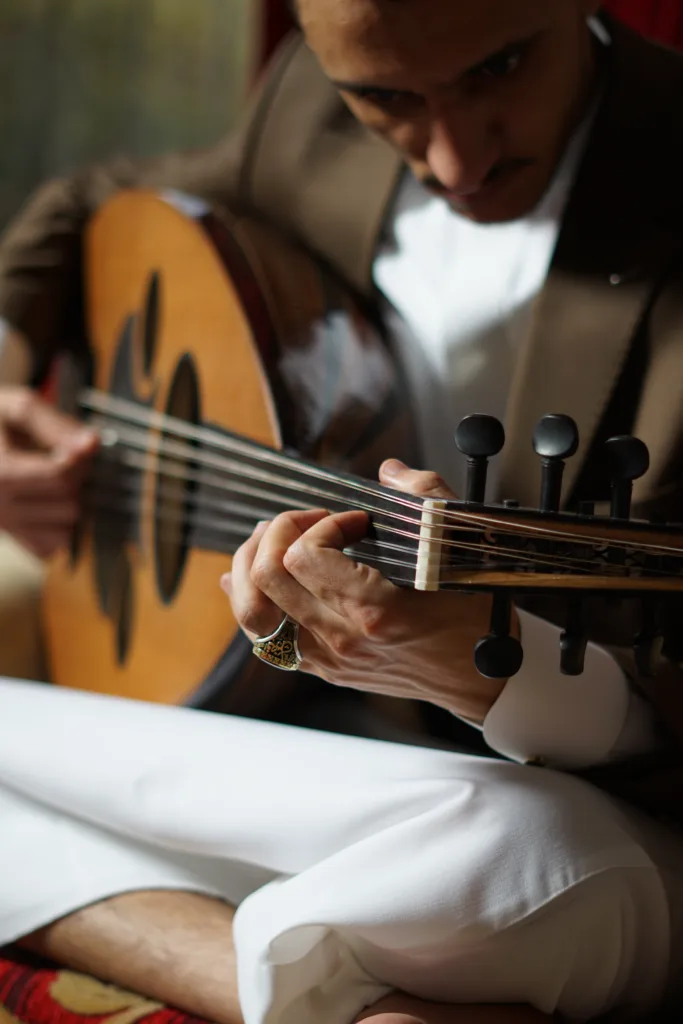 Posted in
Life & Culture, Dance
Posted in
Life & Culture, Dance
The agony and the ecstasy of Yemeni Tarab
Text Aseel Ehab | Photography Somaya Samawi
Throughout history, wherever there have been people, there has been some form of musical expression. In a country like Yemen, with a civilisational depth stretching back thousands of years, people have developed accumulative musical styles that gave rise to what we now recognise as Yemeni tarab.
The Yemeni version of tarab is built around the oud as a central instrument, and encompasses five main traditional genres: San‘ani, Lahji, Hadhrami, Tihami, and Shabwani. Each style reflects the social rhythms and topographical temperaments of its birthplace—from the mountainous chill of Sana’a to the humid pulse of Hudaidah or Aden. Beyond these, there are still more micro-styles – songs that emerged from smaller cities like Aden, Taiz, and villages across the highlands – echoing the dialects, poetry, and pacing of its people.

This diversity is not incidental. Geography and music formulate the way Yemenis express and feel. In colder and mountainous zones like Sana’a and Al-Mahwit, the musical rhythm is slow compared to the rapid tempo music of warm coastal cities like Hudaidah, Aden, Lahj, and Hadramout. Before the oud, old generations used the qanbūs (a smaller, high-pitched lute), the sahn (metal tray percussion), or clapping, which anchors the voice in historical multiplicity.
In the aftermath of the war, Yemen’s economic collapse and rising unemployment left an entire generation in limbo. The government electricity project came to a complete halt, and it took more than a year to adopt the transition to solar energy systems and privatise the electricity sector. These dark days were accompanied by a total crisis in labour markets and the provision of basic necessities.

Yemeni nights, meanwhile, have been submerged in darkness with no street lights, neon signs, stage performances, or any sort of entertainment events. Nonetheless, Yemenis defy the global norms of joy by creating a unique structure of nightlife without nightclubs. With few formal outlets for entertainment or expression, young Yemenis have begun forging their own forms of nightlife—not through clubs or public events, but through takhzinah, the communal ritual of chewing the country’s native plant, qat.
These extended sessions are often spaces of pause, where men – and increasingly women – offer a lifebuoy to escape the harsh contours of economic collapse, political drudge, and everyday anxiety. Youth, in particular, revel in the routine. Many even take to TikTok, sharing videos of themselves playing the oud among their friends at a majlis, diffusing their rituals to the digital.
Many who partake in takhzinah often explain how tarab songs resonate differently, as though the leaf allows lyrics to wrap around memory and squeeze to intensify the feelings. In a conservative context like Yemen, expressing emotions isn’t easy. Tarab, therefore, plays its role in reshaping people’s feelings in a clear, vivid way, especially during the one time they truly feel very emotional: takhzinah time.
During a takhzinah, songs become the only means for a Yemeni to escape harsh reality and enter a sweet illusion—a fantasy where he can, for instance, express his love for his beloved without the fear of consequences. Songs harmonise with the emotional journey of a gathering and its various ebbs and flows. The first stage is the alarming phase, one of rising joy and euphoria. Everyone in the diwan becomes animated, engaging in conversations and discussions.
The person’s choice of music aligns with this mood: upbeat, melodious songs with an escalating rhythm that intensify the feelings of this stage. Then comes the calm, a time of stillness and focus. The tempo of the songs slows down in parallel, matching the inward turn of attention. Finally, it’s the dim-out stage. The quietest of songs become the most favoured. At this point, many prefer silence over any music at all.
